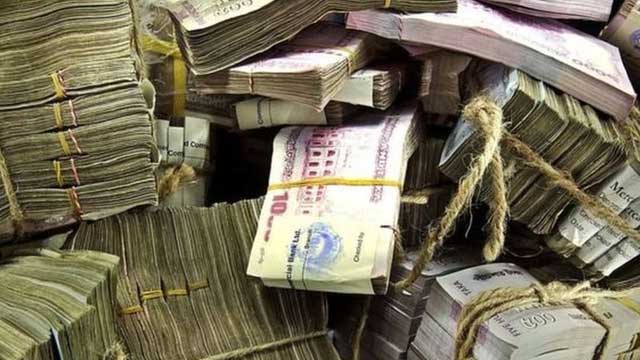The government borrowed Tk 29,378 crore from the country’s commercial banks in seven months (July-January) of the current financial year 2023-24, according to Bangladesh Bank data.
The government, however, repaid the Bangladesh Bank in the period.
According to the BB data, the government repaid Tk 29,498 crore to the central bank during this period, resulting in the net borrowing decreasing by Tk 120 crore from the banking system.
The government had set a borrowing target of Tk 1.32 lakh crore from the banking system for FY24.
However, due to inflation and economic crises, it stays far away from this target.
To stabilise the macroeconomic situation, the government has implemented a contractionary monetary policy.
It has also reduced borrowing from domestic sources.
The net sales of national savings certificates plunged to a negative Tk 6,063 crore in the July-December period of 2023, meaning that repayments of such amounts were made from the government’s exchequer or through loans taken from the banking system.
To address a fund crisis, the government has been issuing bonds to cover its outstanding payments of about Tk 42,000 crore in the power and fertiliser sectors.
The government’s decision to raise interest rates aims to encourage deposits and discourage lending, but it has been caught off guard by a fall in revenue collection despite rising expenditure.
Bankers have expressed concerns that the government’s increasing reliance on borrowing from commercial banks could worsen the existing liquidity crisis in the banking sector.
Excess liquidity in the banking sector decreased from Tk 1.59 lakh crore in October to Tk 1.4 lakh crore in November.
Responding to the ongoing dollar crisis, the Bangladesh Bank utilised the country’s foreign currency reserves, selling approximately $29 billion over the past 31 months.
Of this amount, $8 billion was allocated to banks in July-January of FY 2023-24, $13.5 billion in FY23 and $7.62 billion in FY22.
This process consequently absorbed an equivalent amount of takas from the banking system, which has contributed to the prevailing liquidity pressure, bankers said.
The presence of increased levels of distressed assets, particularly non-performing loans, coupled with sluggish deposit growth, has further strained liquidity conditions in the banking sector, they said.
In the past financial year 2022-23, the government’s borrowing from the country’s banking sector amounted to Tk 1.24 lakh crore.
Of the amount, Tk 98,826 crore was borrowed from the central bank and Tk 25,296 crore from the country’s commercial banks.
Recognising that further borrowing from the Bangladesh Bank could fuel inflationary pressures, the government exercised prudence following its substantial borrowing, bankers said.
When the central bank extends loans to the government, it effectively injects new money into the economy, potentially driving up consumer prices and contributing to inflation, they said.
To manage its borrowing needs, the government primarily relies on advances, overdrafts, and the issuance of treasury bills and bonds from the banking system.
The heavy reliance on borrowing from the banking system may signal challenges in revenue generation and limited access to alternative financing avenues, bankers said.
The government borrowing from non-banking domestic sources include government T-bills and bonds owned by non-bank financial institutions, insurance firms, and private investors, as well as savings vehicles developed by the Directorate of National Savings.
The total outstanding loans of the government from the commercial banks increased to Tk 2,61,847 crore on November 29, 2023 against Tk 2,39,615 crore on June 30, 2023, according to the BB data.
However, the government’s total outstanding borrowing from the bank sector declined to Tk 3,97,417 crore as on November 29, 2023 against Tk 3,93,774 crore on June 30, 2023.





